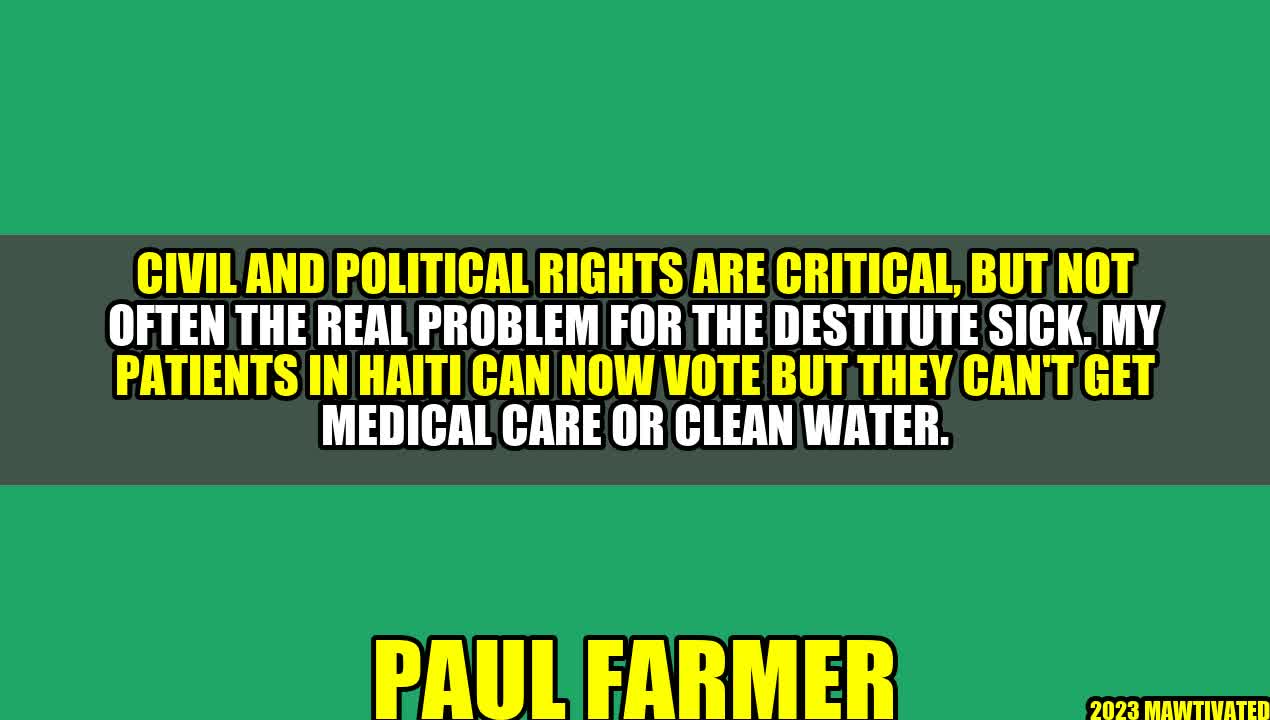Civil and Political Rights Can’t Fix Health Disparities

Paul Farmer, a physician and medical anthropologist, once said, “Civil and political rights are critical, but not often the real problem for the destitute sick. My patients in Haiti can now vote but they can’t get medical care or clean water.” This statement holds true in many parts of the world where governments have pledged to uphold human rights but fall short when it comes to providing basic necessities such as healthcare and clean water.
An Inspiring Story
A few years ago, I had the opportunity to travel to a remote village in Uganda to volunteer at a local medical clinic. On the first day, I met a little girl named Amina. She was six years old and had never attended school because she suffered from a debilitating illness. Her parents couldn’t afford to take her to a hospital, so they took her to a local traditional healer who prescribed herb remedies and used a red-hot knife to make incisions on her body to release toxins. But none of these treatments worked, and Amina’s condition continued to worsen.
When Amina arrived at the clinic, she was severely malnourished, had a high fever, and was barely conscious. The doctors and nurses immediately started treating her, gave her fluids, and put her on antibiotics. Within a few days, Amina started showing signs of improvement. She could sit up again, her fever had gone down, and she was able to eat solid foods for the first time in months.
Over the next few weeks, Amina received regular medical care, and her condition continued to improve. She started gaining weight, had more energy, and was able to walk again. The doctors diagnosed her with a rare genetic disorder, and although they couldn’t cure it, they were able to manage her symptoms and provide her with a better quality of life.
Amina’s story is just one of many examples of how access to healthcare can make a significant difference in the lives of people suffering from poor health. However, too often, people living in poverty are denied this basic human right.
and Case Studies
Paul Farmer is an example of someone who has dedicated his life to addressing health disparities in impoverished communities. Born in Massachusetts in 1959, Farmer attended Duke University and received his medical degree from Harvard in 1990. In 1987, he co-founded Partners In Health (PIH), a non-profit organization dedicated to providing quality healthcare for people living in poverty.
Under Farmer’s leadership, PIH has become a leading organization in the global health movement. They have established healthcare programs in countries such as Haiti, Rwanda, Peru, and Mexico. PIH has also been instrumental in advocating for policy changes to improve health outcomes for everyone, regardless of their economic status.
Farmer’s work has not gone unnoticed. He has received numerous awards, including a MacArthur Fellowship in 1993 and the United Nations Secretary-General’s Special Advisor for Community-Based Medicine and Lessons from Haiti in 2009. In addition to his medical work, Farmer is also a professor at Harvard University, where he teaches courses on public health and human rights.
Farmer’s story is just one example of how individuals can make a difference in addressing health disparities around the world. But it’s not just up to individuals—it’s up to governments and international organizations to prioritize healthcare as a basic human right and allocate resources accordingly.
Conclusion
Civil and political rights are important, but they can’t fix health disparities on their own. To ensure that everyone has access to quality healthcare, governments and international organizations must prioritize it as a basic human right. Here are three ways they can do that:
- Invest in healthcare infrastructure in impoverished areas
- Provide education and training for healthcare workers in those areas
- Advocate for policy changes that prioritize healthcare as a human right
Ultimately, we all have a responsibility to work towards a world where everyone has access to quality healthcare, regardless of their economic status. By doing so, we can help ensure that stories like Amina’s become the norm, not the exception.
Hashtags
#GlobalHealth #HealthcareForAll #HealthEquity #PublicHealth #MedicalAnthropology
SEO Keywords
Health disparities, access to healthcare, basic human right, healthcare infrastructure, healthcare workers, policy changes, global health, public health, medical anthropology
Article Category
Health

Curated by Team Akash.Mittal.Blog
Share on Twitter
Share on LinkedIn